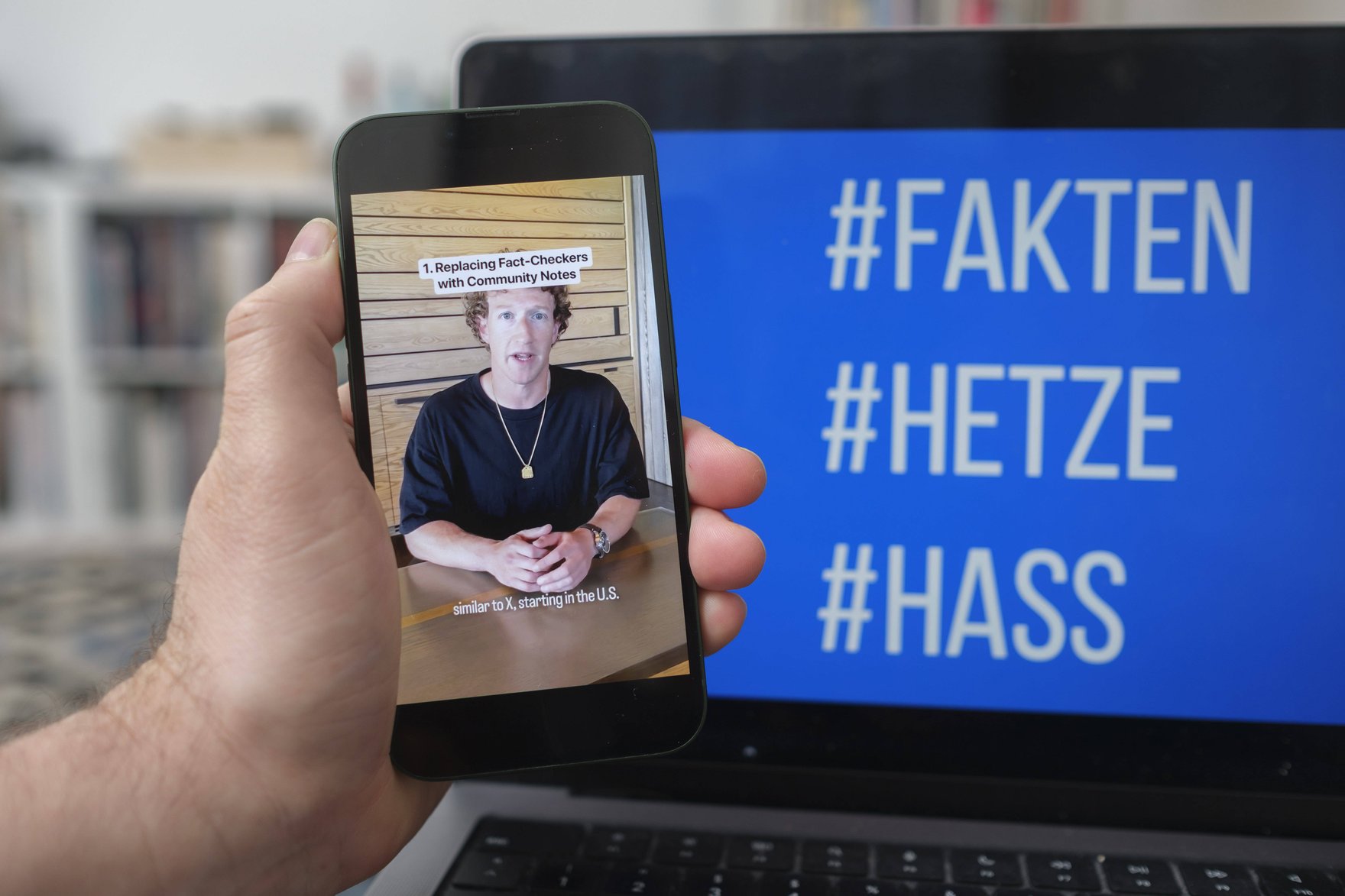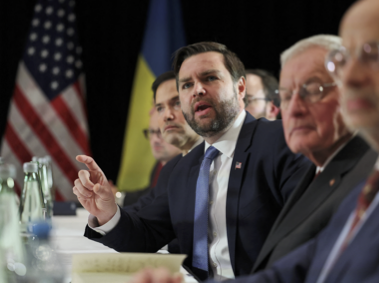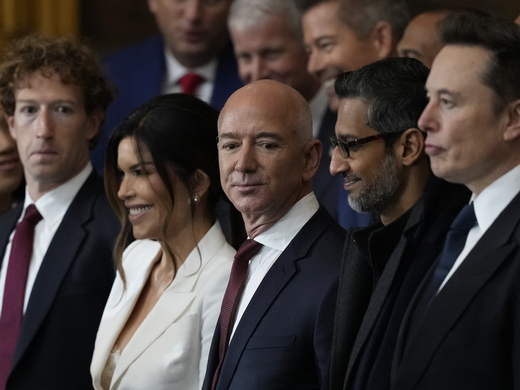For the past few months, one term has increasingly made headlines: “broligarchy.” It refers to the rise of a group of ultra-rich tech CEOs and entrepreneurs who have gained influence under the new Donald Trump presidency in the United States. Surrounding Trump on Inauguration Day were, among others, Elon Musk (CEO of Tesla, Inc., X Corp. and SpaceX), Peter Thiel (former CEO of PayPal), Marc Andreessen (general partner of Andreessen Horowitz), Tim Cook (CEO of Apple) and Mark Zuckerberg (CEO of Meta). Elon Musk has become a key figure in the Trump administration, thereby shaping US politics.
The rise of this broligarchy reflects changes in the tech industry, especially in social media. On January 7, 2025, Zuckerberg announced in a video posted on Meta’s website that the company was removing content restriction and eliminating fact-checking; a few days later, Meta’s human resources vice president announced the company was ending its diversity, equity and inclusion (DEI) initiatives.
Meta’s policy shift was preceded by a number of important internal changes. Indeed, on January 2, Nick Clegg, Meta’s president of global affairs, left the company after six years. He was replaced by Joel Kaplan, a former Republican operative who once served as the vice president of global public policy for Facebook/Meta. In a blog post accompanying Zuckerberg’s video, Kaplan argued that “it’s not right that things can be said on TV or the floor of Congress, but not on our platforms.” Another change, made on January 6, was the appointment of Dana White to Meta’s board of directors. White is the CEO and president of the Ultimate Fighting Championship (UFC), a mixed martial arts organization close to President Trump.
How and why did Meta adopt its fact-checking program in the first place? One must go back to 2016 when the company opted to fight mis- and disinformation on its platforms (Facebook, Instagram and WhatsApp). The decision was made following widespread criticism over its role in the 2016 US elections, Brexit and the Cambridge Analytica data-harvesting and microtargeting scandal.
For the United States, the company chose seven fact-checking partners: Politifact, Factcheck.org, Associated Press, Lead Stories, Agence France-Presse, Science Feedback and the Daily Caller. As a side note, it is surprising to see the Daily Caller among these partners, since it is a right-wing organization founded by former Fox News presenter Tucker Carlson and a publication that is known for pushing disinformation. The Daily Caller was added as a partner at the request of Joel Kaplan, who was Facebook’s vice president of global public policy at the time.
The role of these outsourced fact-checkers was to flag and label content regarded as false. If rated false, content could be downgraded by the algorithm. Users were also given warning signs if they wished to share that content. The deplatforming of any content deemed hate speech remained the prerogative of Meta.
How well did fact-checking work at Meta? According to an article written in February 2020 by tech journalist Judd Legum, “the reality is that almost nothing on Facebook is fact-checked.” Legum reported that Facebook invested just 0.003 percent of its 2019 revenue in this program.
Nonetheless, despite the small effect that fact-checking may have had, the decision to abandon it altogether will have consequences, especially if the policy is extended beyond the United States.
Meta’s policy shift was preceded by a number of important internal changes.
Meta’s head of global business, Nicola Mendelsohn, told Bloomberg on January 20 that the company will keep fact-checkers outside the United States for now and would “see how that goes.”
Does this mean the United States is a testing ground? It’s unclear. But according to a story by Ananya Bhattacharya in the non-profit publication Rest of World, Meta had already been gradually reducing its investment in third-party fact-checking for several months, leading to concerns among public interest advocates, in particular those operating in countries where mis- and disinformation on social media are high-profile problems. For example, Bhattacharya reported that the fact-checking websites Aos Fatos in Brazil and Soch Fact Check in Pakistan had already made the decision to seek funding sources other than Meta.
If the company’s decision to end fact-checking is rolled out internationally, it could have disastrous consequences. In many countries, Meta’s platforms remain a main source of information and communication. While Facebook is often regarded as an “old” social media network in the United States and Europe, it has continued to grow internationally. With more than three billion monthly active users worldwide, Facebook is the most used social media network, followed by YouTube, Instagram and WhatsApp.
To understand the impact that fact-checking can have in countries where Facebook is the main source of information, where press freedom is low or the media environment poor, one need only refer back to the case of Myanmar. In 2018, the United Nations concluded that Facebook played a role in the genocide of the Rohingya in Myanmar by allowing disinformation and hate speech against the Muslim minority group to run rampant on the platform.
Amnesty International reached the same conclusion in its 2022 report, The Social Atrocity: Meta and the Right to Remedy for the Rohingya, writing that “Meta’s content-shaping algorithms proactively amplified and promoted content on the Facebook platform which incited violence, hatred, and discrimination against the Rohingya.”
An investigation commissioned by Facebook into a similar situation in Sri Lanka determined the platform had played a role in deadly riots in early 2018. Although the company apologized, it apparently did not learn from its mistake; Facebook allowed politicians to publish misinformation ahead of the country’s 2019 presidential election. In 2025, with artificial intelligence playing a larger role in the spread of mis- and disinformation, Meta’s decision to get rid of fact-checkers is deeply worrying.
To understand the impact that fact-checking can have in countries where Facebook is the main source of information, where press freedom is low or the media environment poor, one need only refer back to the case of Myanmar.
Women are more likely to see the consequences of the removal of fact-checkers. According to a 2024 study by researchers at Dublin University, Recommending Toxicity, some algorithms used by social media platforms, namely YouTube and TikTok, amplify misogynistic and male supremacist content.
The researchers found that recommender algorithms fed male-identified accounts with an increasing amount of male supremacist, anti-feminist or other extremist content, whether the users sought out such content or not. Thus, getting rid of fact-checking can be expected to lead to more misogynistic content, to the detriment of women and girls, but also of young men.
Another concerning decision made by Meta in January lies in its policy on hateful conduct. Rather than using the word “hate speech,” the policy now uses the term “hateful conduct,” thereby moving away from any internationally accepted definition. Further, although the policy still claims that Meta will “remove dehumanizing hate speech” and “harmful stereotypes, which we define as dehumanizing comparisons,” the examples provided do not reflect such a claim. Indeed, insults about someone’s physical appearance, mental characteristics, intellectual capacity and mental health are now allowed. So are derogatory terms related to sexual activity.
For example, the policy states that “we do allow allegations of mental illness or abnormality when based on gender or sexual orientation, given political and religious discourse about transgenderism and homosexuality and common non-serious usage of words like ‘weird.’” Note here the use of the word “transgenderism,” a term used as a slur by members of the far-right in the united States. Restrictions on statements of religious, ethnic or gender superiority or inferiority have also been removed, including on statements such “I believe males are superior to females.”
Investigations by journalist Casey Newton, the founder and editor of the newsletter Platformer, and by Sam Biddle, technology reporter at American left-wing non-profit news organization The Intercept, provide concrete examples of how far users are now able to go to insult and dehumanize groups and individuals. As noted by Biddle in The Intercept, allowable content includes explicitly racist phrases and comparisons of immigrants to criminals; Meta seems to draw the line at comparisons to animals. In a Platformer article published on January 9, 2025, Newton focuses on the implications for LGBTQ+ people. According to guidelines provided by Meta to moderators, phrases such as “there’s no such things as trans children” or “a trans woman isn’t a woman” are now allowed. These allowances contradict the policy’s claim that it will remove dehumanizing speech. Permitting such speech puts targeted communities at risk and may lead individuals to self-censor to avoid insults. Indeed, the self-silencing of minority voices can be regarded as the type of suppression of speech that the social media company declares itself to be defending against.
Meta’s new hateful conduct policy is in line with a renewed backlash against LGBTQ+ people in the United States. In its 2023 and 2024 reports, the US-based Human Rights Campaign Foundation declared a national state of emergency for LGBTQ+ Americans. According to the organization, in 2023, more than 85 anti-LGBTQ+ bills were passed into state law, followed by an additional 40 across 14 states in 2024. The vast majority of these “have specifically targeted transgender people in an attempt to take away the transgender community’s basic freedoms.”
Since his January 20 inauguration, President Trump has passed a number of executive orders targeting transgender people. One seeks to ban transgender athletes from women’s sports, and another states that the US government will recognize only two sexes, male and female, condemning what the administration calls “gender ideology extremism.” The latter order is particular jarring as it denies transgender people their identity. Meta’s new hateful conduct policy, which would permit comparisons of transgender people to objects, will only contribute to an increasingly dangerous environment for LGBTQ+ people in the United States.
Meta’s new hateful conduct policy is in line with a renewed backlash against LGBTQ+ people in the United States. In its 2023 and 2024 reports, the US-based Human Rights Campaign Foundation declared a national state of emergency for LGBTQ+ Americans.
The January shift appears to reflect a change in Zuckerberg’s public image and formerly liberal politics. After the assassination attempts on Trump during the 2024 US election campaign, Zuckerberg called Trump’s reaction “one of the most badass things I’ve ever seen in my life.” Zuckerberg also visited the then president-elect at his residence in Mar-a-Lago during the US Thanksgiving holiday.
In another signal of Zuckerberg’s shift to the right, the Meta CEO has been making apologies to the Republicans, who have long criticized Facebook for allegedly suppressing conservative speech.
On January 10, Mark Zuckerberg appeared on The Joe Rogan Experience podcast, which endorsed Trump, to speak about America’s business culture. Zuckerberg claimed that the tech industry needed more “masculine energy” and that “a culture that celebrates the aggression a bit more has its own merits.” It’s important to underline here that the tech industry is still largely dominated by men, including in senior management positions. Indeed, 2021 statistics from the Pew Research Center, a non-partisan think tank, show that women comprise only about 25 percent of the tech workforce. Meta’s board of directors is dominated by men; in a 2024 list from Technology Magazine of the top 10 technology CEOs, nine of the 10 are men.
Indeed, Zuckerberg’s claim that the tech industry needs more masculine energy implies an opposition to “feminine energy,” though it’s unclear what that might mean. His praising of a culture that celebrates aggression is worrying if we take into account that toxic masculinity, alpha-male culture and incel movements are on the rise, especially on social media. Individuals such as Andrew Tate, a self-proclaimed misogynist influencer, have gained popularity among a cohort of young men across the globe.
Meta’s major changes are part of a larger shift in Silicon Valley, exemplified by Elon Musk’s takeover of Twitter, Marc Andreessen’s “Techno-Optimist Manifesto” and the widespread presence of tech CEOs in the front rows at President Trump’s inauguration. As tech companies seek to curry favour with Trump, it appears that women, immigrants, people of colour and LGBTQ+ people will feel the impact, particularly in the United States. Whether the European Union’s Digital Service Act, which tries to protect users from misinformation, disinformation and hate speech, will prevent an enforcement of Meta’s new policies in European countries is yet to be seen.



